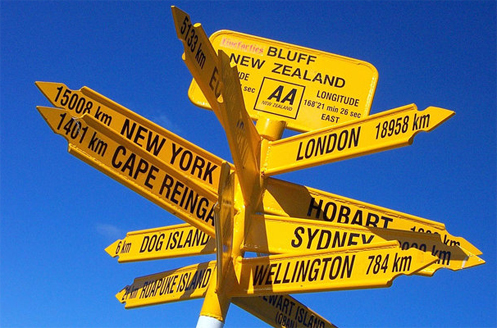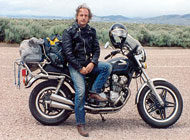Profile: New Zealand Calling
Zigy Kaluzny wanted to get away – far away. And he didn’t just want to visit a country, he wanted to see it. So he contacted a bike dealer and arranged to buy a 1996 BMW R1100GS, with a guaranteed buy-back at the end of his trip. Off he went to New Zealand.
It was a trip filled with serendipity. Upon Kaluzny’s arrival in Wellington, on New Zealand’s North Island, the dealer picked him up at the airport and dropped him at the hostel where he had reservations. The hostel, or “backpacker†as they are known there, was literally right around the corner from the dealership.
After checking in at the backpacker, he strolled over to the dealership to handle the paperwork with the bike. The dealer mentioned that one of his customers was planning to visit the U.S. and would love to talk to him, but was away on his sailboat at the moment. Perhaps when Kaluzny returned the bike . . .
Two Big Islands
New Zealand consists of two long, narrow main islands and is approximately the size of California or England. One thousand miles in length, there is reportedly no place on either island farther than 75 miles from the ocean. Intending to ride the South Island first, Kaluzny boarded a ferry and started riding counter-clockwise around it. New Zealand has impressive mountains, but, as Kaluzny says, “Since I live in the mountains, I wanted to stay by the ocean.â€
The North Island has 75 percent of the population and two of the country’s largest cities, Wellington and Auckland. The South Island has the other 25 percent of the population, with Christchurch as the largest city.
“The South Island is more beautiful. It’s much more agricultural, it’s sheep country, lots of rolling hills. Plus, I’ve never been to a place where you can be at a glacier that then runs down through the jungle to the ocean. There’s a jungle on either side of the glacier and the run-off goes to the ocean right there. Climatically I don’t think there’s any other place like that in the world.â€
Kaluzny didn’t have a plan or itinerary.
“I would just wander, and I knew about some places I was curious to go to, because I had done some research. But for me it’s more the day to day experience of being in a place and seeing what happens. I’d run into motorcyclists all the time, and sit and have dinner if we were staying in the same hostel.â€
One spot of particular interest was the town of Blackball. This mining town was the site of a big union struggle years ago and has a lot of history. The main hotel is an old Victorian building that is “a target for motorcyclists,†says Kaluzny. It was named the Blackball Hilton, but the international hotel chain sent them a cease and desist letter, so they changed the name to “Formerly the Blackball Hilton.”
“I pulled up and there were about a dozen motorcycles, and I immediately sat down and started talking with the riders. With motorcyclists, unless they’re a bunch of Harley guys, in general, you’re all immediately companions of the road.â€
On another day, in a tiny town whose name he doesn’t remember, Kaluzny was sitting having coffee and he looked out the window and saw a couple walking around the GS and talking about it. “I go out and I say hi and they start talking to me and I realize it’s the couple he (the dealer in Wellington) was talking about. So they invited me to come and stay with them.â€
That openness and friendliness is part of what Kaluzny loves about New Zealand.
“The people are tremendously friendly, but there’s enough British reserve so it’s not like you’re always being bugged by somebody. It’s like America in the ’60s, just rip out the Vietnam war. Most stories from travel, for me at least, are either really terrible meals or really weird people, or experiences that could have been dreadful but turn out OK. I don’t have any like that from New Zealand.â€
What he does have are stories of touching encounters. In a small town one day, getting ready to ride after having lunch, “I’m putting my helmet on and a little old lady comes up, a very elegant little old lady, and she says, ‘Just touring are we?’ And I said yes, that’s right, and she said ‘Well, how do you like our country?’ I went into my 5-minute spiel about how beautiful it was, how friendly the people were, how much I enjoyed the food, why I love New Zealand, and she listens and she says ‘Yes, we think so too.’ I smiled for the next 20 kilometers.â€
Not All Smiles
There was one New Zealander, however, who Kaluzny would rather not have encountered.
“New Zealand has the world’s only alpine parrot. They are profoundly destructive. They’ll rip up tents, they chew boots, they love rubber and fabrics like that. I come out in the morning and some parrot has feasted on my seat.â€
It wasn’t as if he hadn’t been warned. There were signs in the parking lot to “Be aware the kea is here.†But what American would suspect a bird twice the size of a pigeon would do such damage?
One subtle danger for Kaluzny was the lack of traffic on the highways. It was common to be riding a major highway and not see another vehicle for minutes at a time.
“We (motorcyclists) are so used to being hypervigilant, then suddenly, when you’re in the middle of nowhere, you stop some of the hypervigilance after awhile. And of course that’s always dangerous. I’d have to tap myself on the helmet and say, Zigy, there’s a car out there somewhere, pay attention.â€
An annoyance was the ubiquitous sand flies, little gnat-sized critters.
“They are everywhere. If I would stop along the road and want to take a nap I’d have to keep my helmet on. You can’t camp out without being in a tent.â€
Nearing the End
After circling the South Island Kaluzny took the ferry back to the North Island, to Wellington, and headed counter-clockwise around it. At one small town of about two blocks, Onga-Onga, “I liked it so much, and it was getting late, so I wanted to stay there where it was totally quiet.†There were no hostels, and a local tried unsuccessfully to find him a place to camp, so he rolled on.
Then, on the very last day he was stopped along a beach and a car pulled up. Two people got out, a Maori (native) woman and her daughter. As they talked, she asked Kaluzny about disappointments. He replied that he had not gotten to attend a Maori hangi, a tribal feast.
Taking a pen and paper, she wrote and handed him the paper, saying, “Here’s my name, my phone number, and my email. Next time you come back over call me and we’ll invite you over for one.”
“I was really touched by that,†he says. “It still gives me goose bumps, it was just generous.â€
And so typically New Zealand.
Biker Quote for Today
If you see me in your rear view on one wheel . . . stay in your $#@% lane! (OK, I do have problems with this quote but it was interesting so I figured I’d use it.)
Tags: New Zealand

